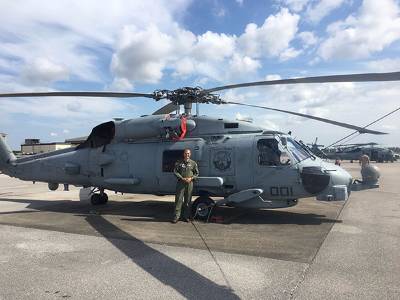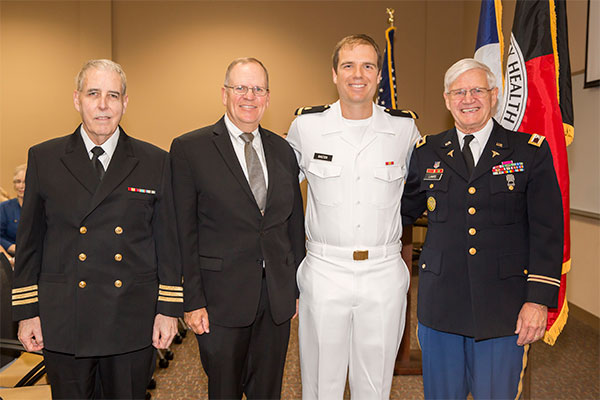Flying High
Medical Student to Become Flight Surgeon

With his two uncles in the U.S. Air Force, Ryan Baxter, remembers a lot of trips as a child to San Diego.
“The experiences made an impression on me growing up.” Baxter said. “I thought about going into the military after high school. But instead went straight to college. Once I heard about being in medicine and serving in the military, I thought what a great way to have the best of both worlds – serve my country and have fun.”
Baxter, a fourth-year medical student, chose the U.S. Navy. He began as an Ensign, the entry-level commissioned officer’s rank in the U.S. Navy, and a Medical Corp. Baxter said the U.S. Navy is adamant about being an officer first, a doctor second.
“For me, flight medicine or the official name flight surgery, was extremely interesting,” Baxter said. “You become an air examiner by working with preventative medicine for pilots and the crew. And one of the fun experiences has been and will be to get to do flight school with pilots. I got a taste of it at my four-week clerkship when I shadowed flight surgeons to learn what their jobs were. I also was allowed to go up in the helicopter as second seat and get flying time. I loved it, and the experience revalidated my decision to join. That was what won me over.”
Baxter served in the U.S. Naval Reserve while in medical school and will go into active duty after graduation. The U.S. Navy credits his time in medical school as in service time. After his four years, he officially became an officer at the Military Commissioning Ceremony where he was promoted to a Third Officer Level Lieutenant.
Baxter enjoyed his time at the Texas Tech University Health Sciences Center School of Medicine. His best memory was that of his Family Medicine Rural rotation experience at Alpine, Texas. He was able to diagnose a patient who had repeatedly been admitted to the hospital. Baxter figured out a drug she was taking from Mexico was labeled Indomethacin, but it also had a steroid betamethasone that was unreported and dangerous to her long-term health.
“It was the first memory I had that I made a difference and helped someone,” Baxter said. “It feels nice, and I am elated for the future real-world responsibilities. I know I will do fine because the School of Medicine has prepared me well.”

Related Stories
Celebrating Veterans: TTUHSC’s General Martin Clay’s Legacy of Service and Leadership
From his initial enlistment in the Army National Guard 36 years ago to his leadership in military and civilian health care management roles, Major General Martin Clay’s career has been shaped by adaptability, mission focus and service to others.
Texas Tech University Health Sciences Center School of Nursing Named Best Accelerated Bachelor of Science in Nursing Program in Texas
The TTUHSC School of Nursing Accelerated Bachelor of Science in Nursing (BSN) program has been ranked the No. 1 accelerated nursing program in Texas by RegisteredNursing.org.
TTUHSC Names New Regional Dean for the School of Nursing
Louise Rice, DNP, RN, has been named regional dean of the TTUHSC School of Nursing on the Amarillo campus.
Recent Stories
The John Wayne Cancer Foundation Surgical Oncology Fellowship Program at Texas Tech University Health Sciences Center Announced
TTUHSC is collaborating with the John Wayne Cancer Foundation and has established the Big Cure Endowment, which supports the university’s efforts to reduce cancer incidence and increase survivability of people in rural and underserved areas.
TTUHSC Receives $1 Million Gift from Amarillo National Bank to Expand and Enhance Pediatric Care in the Panhandle
TTUHSC School of Medicine leaders accepted a $1 million philanthropic gift from Amarillo National Bank on Tuesday (Feb. 10), marking a transformational investment in pediatric care for the Texas Panhandle.
Texas Tech University Health Sciences Center Permian Basin Announces Pediatric Residency Program Gift
TTUHSC Permian Basin, along with the Permian Strategic Partnership and the Scharbauer Foundation, Feb. 5 announced a gift that will fund a new pediatric residency.
